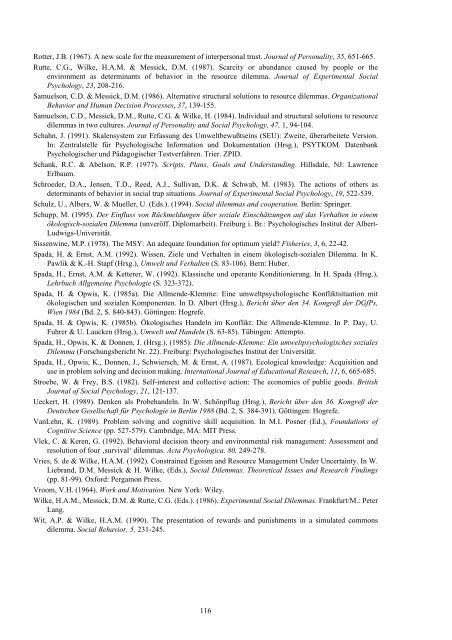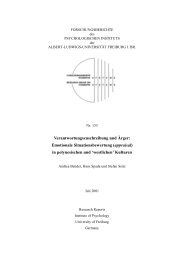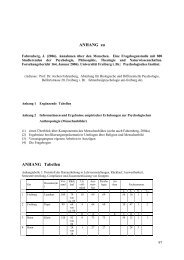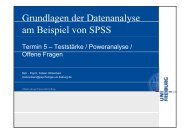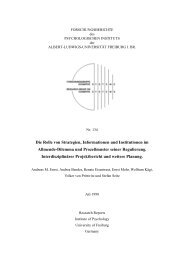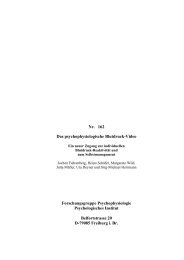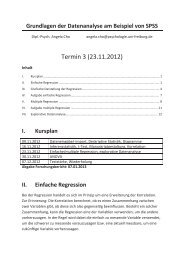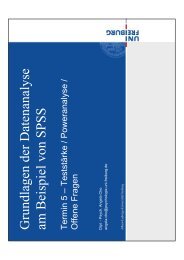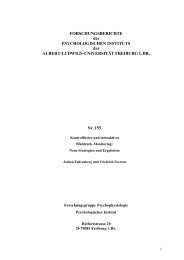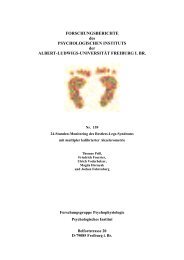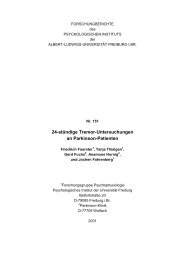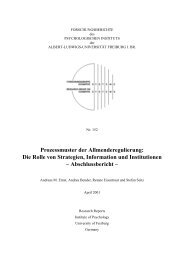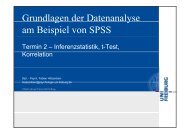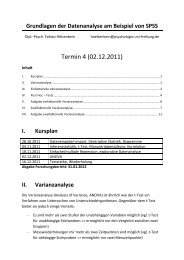Eine computersimulierte Theorie des Handelns und der Interaktion ...
Eine computersimulierte Theorie des Handelns und der Interaktion ...
Eine computersimulierte Theorie des Handelns und der Interaktion ...
Sie wollen auch ein ePaper? Erhöhen Sie die Reichweite Ihrer Titel.
YUMPU macht aus Druck-PDFs automatisch weboptimierte ePaper, die Google liebt.
Rotter, J.B. (1967). A new scale for the measurement of interpersonal trust. Journal of Personality, 35, 651-665.<br />
Rutte, C.G., Wilke, H.A.M. & Messick, D.M. (1987). Scarcity or ab<strong>und</strong>ance caused by people or the<br />
environment as determinants of behavior in the resource dilemma. Journal of Experimental Social<br />
Psychology, 23, 208-216.<br />
Samuelson, C.D. & Messick, D.M. (1986). Alternative structural solutions to resource dilemmas. Organizational<br />
Behavior and Human Decision Processes, 37, 139-155.<br />
Samuelson, C.D., Messick, D.M., Rutte, C.G. & Wilke, H. (1984). Individual and structural solutions to resource<br />
dilemmas in two cultures. Journal of Personality and Social Psychology, 47, 1, 94-104.<br />
Schahn, J. (1991). Skalensystem zur Erfassung <strong>des</strong> Umweltbewußtseins (SEU): Zweite, überarbeitete Version.<br />
In: Zentralstelle für Psychologische Information <strong>und</strong> Dokumentation (Hrsg.), PSYTKOM. Datenbank<br />
Psychologischer <strong>und</strong> Pädagogischer Testverfahren. Trier. ZPID.<br />
Schank, R.C. & Abelson, R.P. (1977). Scripts, Plans, Goals and Un<strong>der</strong>standing. Hillsdale, NJ: Lawrence<br />
Erlbaum.<br />
Schroe<strong>der</strong>, D.A., Jensen, T.D., Reed, A.J., Sullivan, D.K. & Schwab, M. (1983). The actions of others as<br />
determinants of behavior in social trap situations. Journal of Experimental Social Psychology, 19, 522-539.<br />
Schulz, U., Albers, W. & Mueller, U. (Eds.). (1994). Social dilemmas and cooperation. Berlin: Springer.<br />
Schupp, M. (1995). Der Einfluss von Rückmeldungen über soziale Einschätzungen auf das Verhalten in einem<br />
ökologisch-sozialen Dilemma (unveröff. Diplomarbeit). Freiburg i. Br.: Psychologisches Institut <strong>der</strong> Albert-<br />
Ludwigs-Universität.<br />
Sissenwine, M.P. (1978). The MSY: An adequate fo<strong>und</strong>ation for optimum yield? Fisheries, 3, 6, 22-42.<br />
Spada, H. & Ernst, A.M. (1992). Wissen, Ziele <strong>und</strong> Verhalten in einem ökologisch-sozialen Dilemma. In K.<br />
Pawlik & K.-H. Stapf (Hrsg.), Umwelt <strong>und</strong> Verhalten (S. 83-106). Bern: Huber.<br />
Spada, H., Ernst, A.M. & Ketterer, W. (1992). Klassische <strong>und</strong> operante Konditionierung. In H. Spada (Hrsg.),<br />
Lehrbuch Allgemeine Psychologie (S. 323-372).<br />
Spada, H. & Opwis, K. (1985a). Die Allmende-Klemme: <strong>Eine</strong> umweltpsychologische Konfliktsituation mit<br />
ökologischen <strong>und</strong> sozialen Komponenten. In D. Albert (Hrsg.), Bericht über den 34. Kongreß <strong>der</strong> DGfPs,<br />
Wien 1984 (Bd. 2, S. 840-843). Göttingen: Hogrefe.<br />
Spada, H. & Opwis, K. (1985b). Ökologisches Handeln im Konflikt: Die Allmende-Klemme. In P. Day, U.<br />
Fuhrer & U. Laucken (Hrsg.), Umwelt <strong>und</strong> Handeln (S. 63-85). Tübingen: Attempto.<br />
Spada, H., Opwis, K. & Donnen, J. (Hrsg.). (1985). Die Allmende-Klemme: Ein umweltpsychologisches soziales<br />
Dilemma (Forschungsbericht Nr. 22). Freiburg: Psychologisches Institut <strong>der</strong> Universität.<br />
Spada, H., Opwis, K., Donnen, J., Schwiersch, M. & Ernst, A. (1987). Ecological knowledge: Acquisition and<br />
use in problem solving and decision making. International Journal of Educational Research, 11, 6, 665-685.<br />
Stroebe, W. & Frey, B.S. (1982). Self-interest and collective action: The economics of public goods. British<br />
Journal of Social Psychology, 21, 121-137.<br />
Ueckert, H. (1989). Denken als Probehandeln. In W. Schönpflug (Hrsg.), Bericht über den 36. Kongreß <strong>der</strong><br />
Deutschen Gesellschaft für Psychologie in Berlin 1988 (Bd. 2, S. 384-391). Göttingen: Hogrefe.<br />
VanLehn, K. (1989). Problem solving and cognitive skill acquisition. In M.I. Posner (Ed.), Fo<strong>und</strong>ations of<br />
Cognitive Science (pp. 527-579). Cambridge, MA: MIT Press.<br />
Vlek, C. & Keren, G. (1992). Behavioral decision theory and environmental risk management: Assessment and<br />
resolution of four ‚survival‘ dilemmas. Acta Psychologica, 80, 249-278.<br />
Vries, S. de & Wilke, H.A.M. (1992). Constrained Egoism and Resource Management Un<strong>der</strong> Uncertainty. In W.<br />
Liebrand, D.M. Messick & H. Wilke, (Eds.), Social Dilemmas. Theoretical Issues and Research Findings<br />
(pp. 81-99). Oxford: Pergamon Press.<br />
Vroom, V.H. (1964). Work and Motivation. New York: Wiley.<br />
Wilke, H.A.M., Messick, D.M. & Rutte, C.G. (Eds.). (1986). Experimental Social Dilemmas. Frankfurt/M.: Peter<br />
Lang.<br />
Wit, A.P. & Wilke, H.A.M. (1990). The presentation of rewards and punishments in a simulated commons<br />
dilemma. Social Behavior, 5, 231-245.<br />
116


